Post
Published on August 29, 2024
The Dahdaleh Institute is delighted to announce this year's recipients of the 2024-2025 Dahdaleh Global Health Graduate Scholarships, and we extend our warmest congratulations to the following recipients:
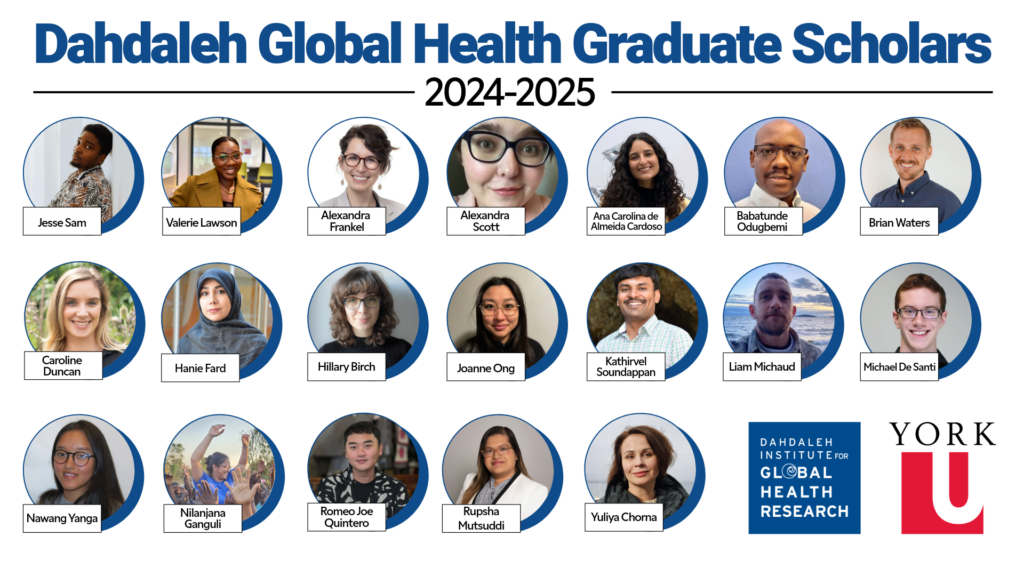
"We are proud and elated to support nineteen exceptional graduate scholars whose research will advance impactful scholarly and real-world contributions to global health across a diverse range of faculties and programs at York University," said Professor Mary Wiktorowicz, associate director of the Dahdaleh Institute. "Their inspiring research pursuits build momentum for the vision of the Dahdaleh Institute for Global Health Research to enhance effectiveness, equity, and excellence in global health research through a critical problem-solving approach to 21st-century challenges."
Master's Level
Jesse Sam
Examining Socioeconomic Factors and Health System Challenges as Obstacles to Accessing Perinatal Care Services in High-Risk Areas.
Jesse is pursuing research in health policy and equity in the graduate Health program under the mentorship of Dr. Farah Ahmed. His research examines the connection between socioeconomic determinants and health system factors. Specifically, Jesse will explore how these factors hinder access to perinatal care services in high-risk areas. Driven by his commitment to addressing healthcare disparities, Jesse’s research aims to provide valuable insights aimed at improving access and equity in maternal and child health services.
“The scholarship will ease my financial worries, enabling me to concentrate entirely on my research. Additionally, the resources available will offer crucial support, including access to experts and advanced technologies, enhancing the quality of my work. Moreover, being part of the Dahdaleh Institute community will provide ample networking opportunities, mentorship, and chances for professional growth. Interacting with fellow scholars will expand my horizons, nurture my intellect, and establish valuable connections in my field.”
Valerie Lawson
Healthcare Access: An Analysis of the National Health Insurance Scheme in Accra, Ghana.
Valerie is an international student from Ghana who holds a bachelor’s degree in political science and French from the University of Ghana. She is a Dahdaleh Global Health Graduate Scholar and is currently pursuing an MA in development studies at York University. Her research interest lies in healthcare where she seeks to examine healthcare access in Africa through the National Health Insurance Scheme (NHIS), using Ghana as a case study. Through this research, she focuses on the perceptions, experiences, and coping mechanisms of NHIS subscribers in response to out-of-pocket expenditure on healthcare services covered by the scheme and examine the relationship between this phenomenon and the healthcare-seeking behaviour and financial well-being of subscribers.
“I was particularly drawn to this scholarship because of its emphasis on supporting graduate students with their research and other scholarly related activities. Conducting research in Ghana is costly; some expenses that have been incurred include travel expenses (airfare and local transportation), research materials, communication cost, etc. This scholarship will not only enable me to cover these costs and conduct this important research but will also empower me to contribute meaningfully to the discourse on global health and humanitarianism.”
Doctoral Level
Alexandra Frankel
Imagining Water Health: Industrial Pasts and Promises of Clean Water Futures.
Alexandra is a PhD candidate in sociocultural anthropology. Her research examines the social and material life of the term "water health" in the Milwaukee, WI, estuary. By tracing this term across efforts to remove lead laterals and legacy industrial contaminants from Milwaukee's waterways and to brand Milwaukee as a water-centric city, this research asks how imaginaries of health are being refashioned to include more-than-human entities, like water, in the context of reckonings with industrial pasts and contentious desired futures. Frankel was a research assistant with the Frictions in Futurity and Cure in Transplant Medicine research team at University Health Network, where she conducted arts-based sensory ethnographic research in transplant clinics and with transplant recipients to improve psychosocial supports for recipients and their kin.
“This graduate scholarship from the Dahdaleh Institute will provide important opportunities for me to develop an interdisciplinary understanding of work in global health. I look forward to learning from colleagues and faculty and to being more involved in the global health research community and scholarly activities. Financial support from the Dahdaleh Institute also enables me to dedicate more time and energy to developing my research.”
Alexandra Scott
Autonomous Weapon Systems, International Humanitarian Law, and the Myth of "Good Enough".
Alexandra is a graduate scholar in the thematic area of Global Health & Humanitarianism with a focus on international humanitarian law (IHL; also known as the laws of war) and autonomous weapon systems (AWS; more commonly known as "killer robots"). In her graduate research project, she will argue that fully autonomous AWS are fundamentally incompatible with customary IHL. More specifically, the lack of direct human responsibility for critical actions taken by fully autonomous AWS (which do not have a human either "in-" or "on-the-loop") is fundamentally incompatible with customary IHL, in which the exercise of moral judgment (and the assumption of the resulting moral responsibility) is a core requirement for an attack to be lawful. Alexandra will place her intervention to this debate within two historical contexts: that of the historical development of IHL and that of the historical pursuit for the ultimate "super weapon", of which AWS is but the latest iteration of such technology.
“A better question might be how the very generous graduate scholarship awarded to me and my involvement with the Dahdaleh Institute haven't supported my research activities and professional development. It has been an absolute pleasure to get to know and to work alongside everyone at the Institute, all of whom are not only incredibly smart and good at what they do but also incredibly kind and generous with their time and expertise. In particular, I am deeply thankful to have had the opportunity to work for Dr. James Orbinski as a graduate research assistant. His mentorship and seemingly unending supply of illuminating and incisive questions have been instrumental as I seek to make my own contribution to the field of global health and humanitarianism.”
Ana Carolina de Almeida Cardoso
(de)Colonizing the Future: Climate Struggles and Resistance in the Era of the Anthropocene.
Ana is pursuing a PhD in environmental studies in the Faculty of Environmental and Urban Change (EUC) at York University, having moved from Nheterõîa (Niterói), Pindorama (Brazil), where she grew up, to live in Tkaronto. She holds a master’s degree in international relations from the Pontifical Catholic University of Rio de Janeiro (PUC Rio) and a bachelor's degree in law from Fundação Getulio Vargas (FGV Direito Rio). Her research interests lie at the intersections between coloniality, modernity and "nature", with particular focus on climate governance and politics, the Anthropocene, and decolonial futures. In the PhD, Ana's research explores the concept of “colonization of the future” and its onto-epistemic implications, framing the climate crisis as a site of struggles for future(s). She has been attending UNFCCC events since 2023, having participated at COP28 in Dubai and at the SB60, in Bonn.
“My time at the Dahdaleh has significantly improved my scholarly and professional development. Since January 2024, I was able to learn about the great diversity of research being carried out by the Dahdaleh research communities and to share information about my work. Having the Institute’s support means having financial stability as an international student living abroad and being able to dedicate myself to my research activities.
Thanks to the Dahdaleh's support, I was able to attend the 60th Session of the Subsidiary Bodies (SB60) of the United Nations Framework Convention on Climate Change (UNFCCC), in Bonn, Germany, where I conducted exploratory fieldwork and followed the international negotiations on the various thematic areas of the climate agenda. There, I also supported the International Indigenous Peoples Forum on Climate Change (IIPFCC) and the Children and Youth constituency (YOUNGO), as I profoundly share the Dahdaleh Institute’s perspective to produce scholarly research that not only supports but also is climate action.
I am extremely grateful for the opportunities that I have had so far, and I am looking forward to continuing to be part of the Dahdaleh research community in the next year.”
Babatunde Odugbemi
The AMR GAP: A comparative analysis of the implementation of national antimicrobial resistance (AMR) Action Plans in High Income and Low to Middle Income Countries.
Babatunde is a member of the pioneer cohort of students in the PhD Global Health program at York University and a Dahdaleh Global Health Graduate Scholar. He holds an MB;BS degree from the University of Lagos, MPH from the University of Sheffield and MSc in Aging and Health from Queen’s University. He has a good understanding of contextual issues affecting the health of populations in LMICs. Having worked as a physician and public health professional in Nigeria, he has also been part of teams conducting research on infectious diseases and improving the capacity of health systems. He seeks to conduct research aimed at improving global response to antimicrobial resistance (AMR) with the guidance of Professor Mary Wiktorowicz.
“I am excited and appreciative to be a recipient of the Dahdaleh Global Health Graduate Scholarship. The opportunity to be a member of the Dahdaleh Institute means exposure to a reputable and collaborative platform which works towards solving real-world global health problems. The scholarship will enable me to focus more time on my research thereby making it easier to achieve my academic goals.”
Brian Waters
Seasonal Variation of Water Security within the Informal Settlements of Freetown, Sierra Leone.
Brian is a PhD candidate in the Geography department at York University and a SSHRC doctoral fellow. He holds two master's degrees from the University of Illinois, one in Agricultural Economics and another in Urban Planning. For the last four years, Brian has been working in Freetown on decentralized water infrastructure, specializing in community-engaged and mixed-methods research. Brian's research explores how seasonality is a core component of water security. He aims to demonstrate how measurements and engagements at different points of the year yield varying results. In addition, by following households and individuals throughout the year, Brian aims to understand directly how the changing "waterscape" of a community affects accessibility for water gatherers and water managers. His work, grounded in feminist geography and political ecology, investigating the intersections of water access, research methodology, and community resilience in Freetown, Sierra Leone.
“This graduate scholarship and my involvement with the Dahdaleh Institute will greatly support my research and professional growth. The scholarship will provide the financial resources I need to focus more on my fieldwork in Sierra Leone, studying how seasonality affects water security. The Dahdaleh Institute's focus on global health and humanitarianism aligns with my research, giving me access to expert mentors and opportunities to share my findings. The Institute's emphasis on innovative and sustainable solutions will also help me improve my skills in community-engaged research and mixed methods, aiding my development as a researcher and professional in water security and global development.”
Caroline Duncan
Optimizing Drinking Water Safety in Cambridge Bay, Nunavut using Participatory System Dynamics.
Caroline is a PhD candidate in civil engineering at the Lassonde School of Engineering with a focus on optimizing drinking water in the Arctic using participatory approaches to system dynamics modelling. Under the guidance of Prof. Stephanie Gora, her research seeks to understand the complex factors that affect the quality and accessibility of drinking water in the Arctic using an interdisciplinary approach. Through her research, Caroline has been working closely with the Municipality of Cambridge Bay, and collaborating with community members, government, and NGO stakeholders involved with drinking water from source to tap. Through this collaboration, a model will be developed to test treatment and policy interventions to optimize drinking water safety.
“Financial support will allow me more time to focus on my studies and provide the flexibility to be in the field when required. The Institute has a wealth of experts in different disciplines for mentorship as well as a diverse group of researchers to foster collaborative learning, innovative thinking and knowledge exchange which I believe will only enhance my research activities and open up opportunities for further networking and skill development.”
Haniehalsadat Aboutorabifard
Upholding Foreign Investors Responsible for Protecting the Human Rights of Living in a Healthy Environment.
Hanie’s academic journey has been marked by extensive research on environmental issues, providing me with valuable insights into the practical implementation and challenges associated with environmental policies, particularly within the financial sector. The amalgamation of her LLB and Environmental Studies has not only deepened her understanding of the world but has also aligned seamlessly with Hanie’s dual passions for law and the environment. Motivated by this synergy, she is currently pursuing a PhD at Osgoode Hall Law School and becoming a graduate research fellow at Dahdaleh Institute where she aims to explore a pivotal question: how can environmental regulations compel foreign investors to be environmentally accountable at the international level? This research endeavor represents the culmination of Hanie’s academic trajectory, merging her legal background with a keen dedication to addressing global environmental challenges.
“Joining the Dahdaleh Institute as a graduate research fellow has been transformative. Not only has it provided crucial financial support for my PhD studies, but it has also presented me with invaluable opportunities to collaborate with esteemed academics and explore long-desired research areas. This financial backing has enabled me to fully focus on my studies, especially during the final semesters of my PhD program. Moreover, the supportive research environment at the Institute has facilitated connections with peers and faculty members who share my research interests. I am eager to deepen my engagement with the Dahdaleh community to enhance my research skills and experiences.”
Hillary Birch
More than Access: Global Health and the Urban Governance of Water Quality in Lusaka.
Hillary is a PhD candidate in Environmental Studies in the Faculty of Environmental and Urban Change at York University, supervised by Professor Roger Keil. She holds a master’s degree in urban governance from Sciences Po in Paris, France, where she studied the urban governance of Ebola in Monrovia, Liberia. She also holds a master’s degree in political science from McGill University. Hillary has worked in various roles in global health related to sexual and reproductive health and early child development. Her research explores how projects of global health intersect with processes of urbanization, shaping flows of water in a city and changing its quality. Her doctoral project focuses on the complexities and contradictions of efforts by global health actors to improve water quality in Lusaka, Zambia, where rapid urbanization and climate change leave many urban residents facing serious health consequences associated with poor sanitary conditions. Her research aims to inform how global health projects in water and sanitation can contribute to more sustainable urban futures by better supporting disease outbreak preparedness and the delivery of good quality drinking water for all. Hillary is a Dahdaleh Global Health Graduate Scholar in Planetary Health, and she holds a SSHRC Doctoral Fellowship. Her research in Lusaka is supported by an IDRC International Doctoral Research Award.
“Receiving this graduate scholarship has supported my research activities by allowing me the freedom to focus on my studies, the institutional support to take risks and explore new initiatives, as well as the access to an impressive network of engaged and committed researchers to collaborate with and learn from. Importantly, the financial support from this scholarship has provided me with ideal conditions as a PhD student, ensuring that I can make efficient progress in meeting my PhD program milestones so that I can set myself up for success during my fieldwork in Lusaka and as I prepare to write my dissertation when I return to Canada.”
Joanne Ong
Trust and Rural Health
Joanne is a PhD student at York University in the Department of Global Health. She holds a BA and MA from York University in sociology. She is passionate about how the social determinants of health, the political determinants of health and the commercial determinants of health shape health and health inequalities across scales. Following her work with Professor Cary Wu, she investigates how trust is among those complex social and structural factors that shape health, especially the health of vulnerable populations. Specifically, she investigates how trust is a critical determinant of health in rural and remote contexts. Her research targets a need to investigate trust in rural and remote contexts and a need to develop measures of trust in rural and remote Canada in the interest of health equity. Against this backdrop, she is also interested in contributing to the literature concerning One Health, which recognizes that the health of people, animals, and the environment are interconnected. Specifically, she is interested in investigating the opportunity to integrate Indigenous ways of living, being, and knowing in the One Health approach. Likewise, she is interested in the implications of One Health interventions for rural and remote peoples. To this end, her research investigates cultural safety, defined as understanding what wellness means for those under consideration as well as the social and historical contexts and structural inequities that shape their experiences and outcomes, in One health interventions.
“This honour not only affords me the opportunity to commit to and pursue my research interests without abandon, it also connects me to other scholars from whom I can learn and with whom I can develop friendships that will help me progress in my degree. I am grateful to the Institute for this honour because being awarded a DI scholarship is not only monetary, it is infinitely about collaboration, synergy and connection, that is, connections to others and their knowledge and research but also their wisdom.”
Kathirvel Soundappan
Influence of- and Practical Approaches Related to Interdisciplinary Areas in the Prevention and Control of AMR (with special focus anti-fungal resistance).
Kathirvel, MBBS, MD (Community Medicine) is an Associate Professor at the Department of Community Medicine and School of Public Health, Postgraduate Institute of Medical Education and Research (PGIMER) Chandigarh, India. He is an alumnus of the WHO Structured Operational Research Training Initiative (SORT IT) and the Summer School of the International Agency for Research on Cancer (IARC-WHO), Lyon (France). He provides clinical services to vulnerable and marginalized populations in northern India in addition to teaching MD, MPH, BPH and PhD scholars. His area of research is Primary/Rural healthcare, Implementation/operational research, AMR, NCDs (Diabetes, Hypertension, Chronic Respiratory Diseases, and Cancer) and the Internet of Things in Healthcare. With Professor Mary Wiktorowicz as his graduate supervisor, he seeks to explore the following research questions beyond the burden of AMR, namely, a) What is the role of interdisciplinary areas (environmental sciences, animal health, plant health, engineering, law, and politics) in the prevention and control of AMR (with special focus on anti-fungal resistance); b) What are the practical political and regulatory approaches available in the control and prevention of AMR in a LMIC context; and c) How will developing an international treaty and or monitoring framework improve political commitment and integration within a national action plan to control AMR in a LMIC context?
“Dahdaleh Global Health Graduate scholarship has already ensured a peaceful working/research environment and connections beyond the grant. The learning from peers has been ensured already which I am excited to experience. My proposed graduate work is a mixture of desk work and some primary data collection that might be primarily supported by this scholarship. Notably, I foresee a change in the approaches in my professional life, i.e., more systematic, comprehensive and pragmatic after my PhD at Dahdaleh Institute.”
Liam Michaud
A Multi-sited Ethnography of Ontario Drug Law in the Context of Overdose.
Liam is a PhD candidate in Socio-Legal Studies at York University. Informed by critical legal studies and policy studies, and drawing on ethnographic and community-based participatory methods, his research examines the tensions and convergences between medico-therapeutic and criminal-legal approaches in global and local health governance. His work has been supported by a SSHRC Canada Graduate Scholarship and by the Nathanson Centre on Transnational Human Rights, Crime and Security at York. He has published work on the barriers to health and healthcare faced by people who use drugs as a result of legal and policy environments in Social & Legal Studies, International Journal of Drug Policy, Policing & Society, among other journals. He has conducted research and written on health inequalities in the context of prison-based needle exchange, surveillance practices in healthcare settings, experiences of police discretion and drug law enforcement at overdose events, and is currently focusing on a project on overdose-related manslaughter prosecutions. He brings 15 years’ experience working in community-based healthcare settings with people in conflict with law.
“The Dahdaleh Global Health Graduate Scholarship will provide me with an opportunity to deepen my engagement with global health research, and further engage in health and drug policy dialogue on themes of drug liberalization and structural drivers of overdose and health disparities transnationally. The learning community at the Dahdaleh Institute will enable me to deepen collaborative networks with scholars working across global settings and facilitate knowledge mobilization related to my research and support its potential policy impact.”
Michael De Santi
Optimizing Water Safety in Humanitarian Response Settings using Machine Learning and Quantitative Microbial Risk Assessment.
Michael is a PhD candidate in the Department of Civil Engineering at the Lassonde School of Engineering. Michael works as a researcher on the Safe Water Optimization Tool (SWOT) project at the Dahdaleh Institute, where he is developing new modelling tools to predict water quality and waterborne illness risk in refugee and internally displaced person settlements. Prior to joining the SWOT team, Michael obtained a BASc in civil engineering from the University of Toronto and worked for several years as a water design specialist. His current research focuses on developing holistic tools for assessing water safety risk in humanitarian response settings.
“This scholarship is so helpful for my research - it lets me dedicate 100% of my time to my research and it also makes me a part of the Dahdaleh community. This is a wonderful group of scholars who look at these research themes from such a broad range of perspectives that it really helps open my eyes to other ways of coming at my own research!”
Nawang Yanga
TB in Tibetan Refugee Settlements: A Critical, Social Science Gaze.
Nawang is a PhD candidate in Health Policy and Equity. Her proposed dissertation will focus on the experience of Tibetan refugees with Tuberculosis (TB) in India through a critical ethnographic lens. Nawang is interested in refugee health, intersectionality and health, equity in academia, and much more.
“I am so extremely thankful to the DIGHR for their continued support and involvement in my research endeavours. This scholarship funds my travel and accommodation to and from India, which is extremely important for me in building rapport with the community I wish to do research on. It will also support any learning and development of my technical skills in language, analysis and so forth. It will allow me to focus on my research endeavours without the constant worry of finances. I will forever be thankful to the people at DIGHR! The DIGHR is an extremely inviting and open space where I hope to foster and build relationships with other scholars in global health!”
Nilanjana Ganguli
Modelling Health Impacts of Climate Change.
Nilanjana (Nell), a PhD candidate in the Faculty of Environmental & Urban Change at York University, brings a unique blend of skills in biotechnology and environmental studies to her doctoral research. Her research takes an intersectional system thinking approach to modelling the gendered health impacts of climate change in Malawi's capture fisheries. Nell worked in the mining sector for six years in West Africa, where she was involved in multiple facets of the business, including HR, communications, and corporate social responsibility. While working in the mining industry, she recognized a need for better integration of health into corporate social responsibility plans, which inspired her to return to academia to learn about the intricate relationships between the environment and human health. She was the project manager for the Dahdaleh Institute project, Complex Adaptive Modelling of the Health Impacts of Climate Change in Malawi, from 2022 to 2024. She is now working as a Graduate Research Assistant (Grant Writing) for the Malawi team and volunteers as a Grant Manager for the Leadership for Environment & Development, Southern and Eastern Africa.
“Through this scholarship program, I have been able to form close relationships with several Dahdaleh Institute community members, which has been invaluable to me in staying on track with my PhD and feeling a sense of belonging in the academic setting. The seminars have been a great way to learn about cutting-edge and innovative research. I am an active member of the Dahdaleh Institute’s community and hope to continue supporting its mission to become leaders in addressing global health challenges through critical problem solving.
DI has supported multiple PD opportunities in the past, which I am very grateful for, and hope to continue seeking out this year. I have received invaluable mentorship from a number of DI scholars, which has continuously been a source of learning and improving my personal skills in research and networking.”
Romeo Joe Quintero
Building Liveable Futures in Camps: Everyday Placemaking Practices of Internally Displaced Women in the Southern Philippines.
Romeo is a PhD candidate and SSHRC Vanier Canada Graduate Scholar in the Faculty of Environmental and Urban Change. He is a research associate at the Centre for Refugee Studies (CRS) and York Centre for Asian Research (YCAR). Romeo holds an MA in Women's and Gender Studies at Carleton University and a BSocSci Honours in International Development and Globalization at the University of Ottawa. His doctoral project will examine the experiences of those living in resettlement and transitory sites for internally displaced persons in the southern Philippines affected by armed conflicts.
“The financial support from the Dahdaleh Institute will support my fieldwork in the southern Philippines, where I plan to conduct 12 months of ethnographic research to understand how internally displaced persons affected by armed conflicts construct their livelihoods, homes, and sense of belonging through collective action.”
Rupsha Mutsuddi
Enhancing Systems of Assistive Interventions for Community Dwelling Older Adults Living with Dementia: A Global Health Approach through Human-Centered Design Methodologies.
Rupsha is a PhD student in the Global Health Program. Her research focus is at the intersection of design, everyday health management, and accessibility. Her Master of Design thesis work was focused around community dwelling older adults living with dementia and understanding daily rituals embedded in technologies. Supported by a Social Sciences and Humanities Research Council Grant, Rupsha worked with community dwelling older adults living with dementia and their care partners to identify these rituals and the insights were utilized to create prototypes using augmented reality to support these rituals in everyday life. Rupsha's PhD focuses on an intersectional approach with disciplines of human-centered design (HCD), gerontology, and global health and will culminate in novel approaches to understanding the experience of people with dementia in different cultural contexts. In support of her PhD studies. Rupsha is also an award-winning emerging designer who has worked with clients such as Detox Market Canada, Habitat for Humanity Waterloo Region, and the Ontario Public Health Association. She sits on the board of the Association of Registered Graphic Designers and represents emerging designers nation-wide and is the co-chair of the RGD's Provisional and Education Committees. Rupsha is also the Vice President of the Canadian Association on Gerontology–Student Connection and a Highly Qualified Professional (HQP) with AGE-WELL Canada's Technology and Aging Network.
“This graduate scholarship allows me to continue to build strong networks with different community centres and organizations focused on enriching the lives of older adults living with dementia in community settings. Collaboration with community partners will be an important tenet of my research practice. I will also continue to explore different human-centered methodologies such as co-design through the creation of co-design tools. In terms of professional development, I will also be presenting at conferences, submitting to peer-reviewed journals, and continuing to mentor emerging designers and researchers in the field of design and aging sector.”
Yuliya Chorna
Moral, conceptual and practical considerations of funding and financing of the global Tuberculosis response
Yuliya is a doctoral student in York's Graduate Program in social anthropology. Professor Margaret MacDonald is a supervisor of Yuliya's PhD project. Yuliya has an academic background in social work, with a Master of Social Work degree from Syracuse University. She has extensive work experience in the field of global health policy and practice, including senior leadership positions for not-for-profit NGOs focused on social equity and rights in the fields of tuberculosis (TB) and HIV/AIDS. Yuliya a member of the Social Science and Health Innovations Network for Tuberculosis (SSHIFTB) at the Dahdaleh Institute since its inception in 2020. During 2019-2023 she served on the WHO Civil Society Taskforce for TB. Yuliya’s research problematizes how TB is being addressed, on a global level, using critical methods and lenses of social anthropology. She is particularly interested in the anthropology of global health policymaking, funding and financing. Her research is supported by the dissertation committee members - Dr. Margaret MacDonald, Dr. Alexandra Widmer and Dr. Amrita Daftary.
“Engagement with the Dahdaleh Institute's activities and scholars enriches my professional development and global health networks. Funding helps me to pursue my research objectives. I appreciate learning opportunities and ongoing support from the Dahdaleh Institute's staff!”
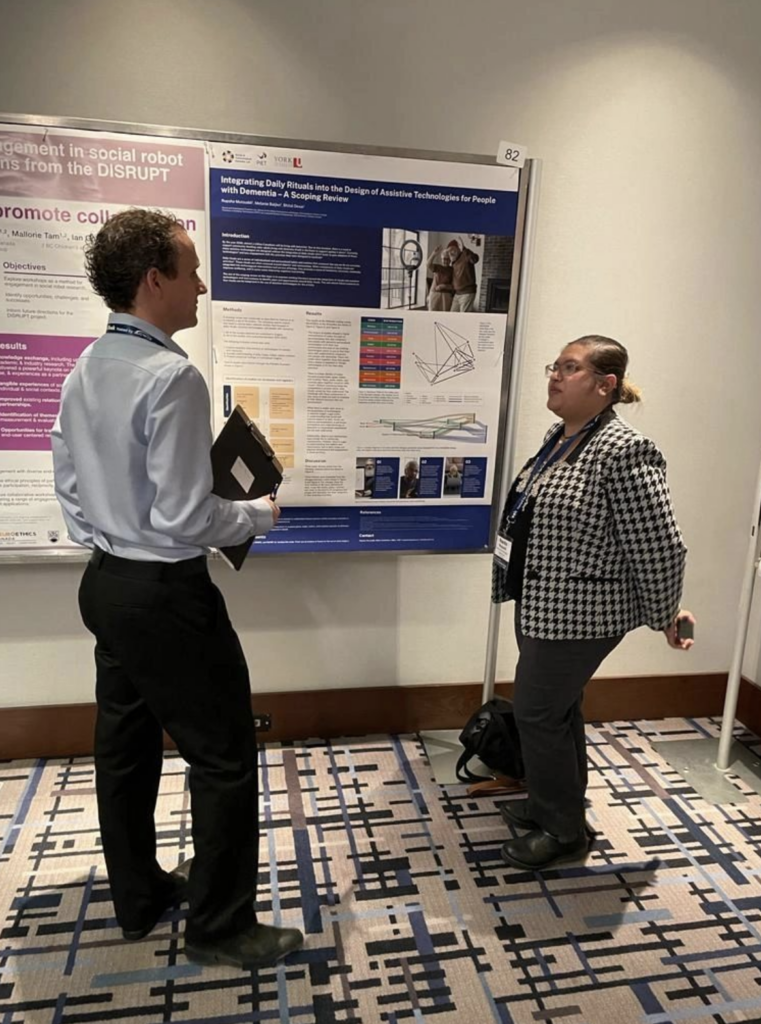
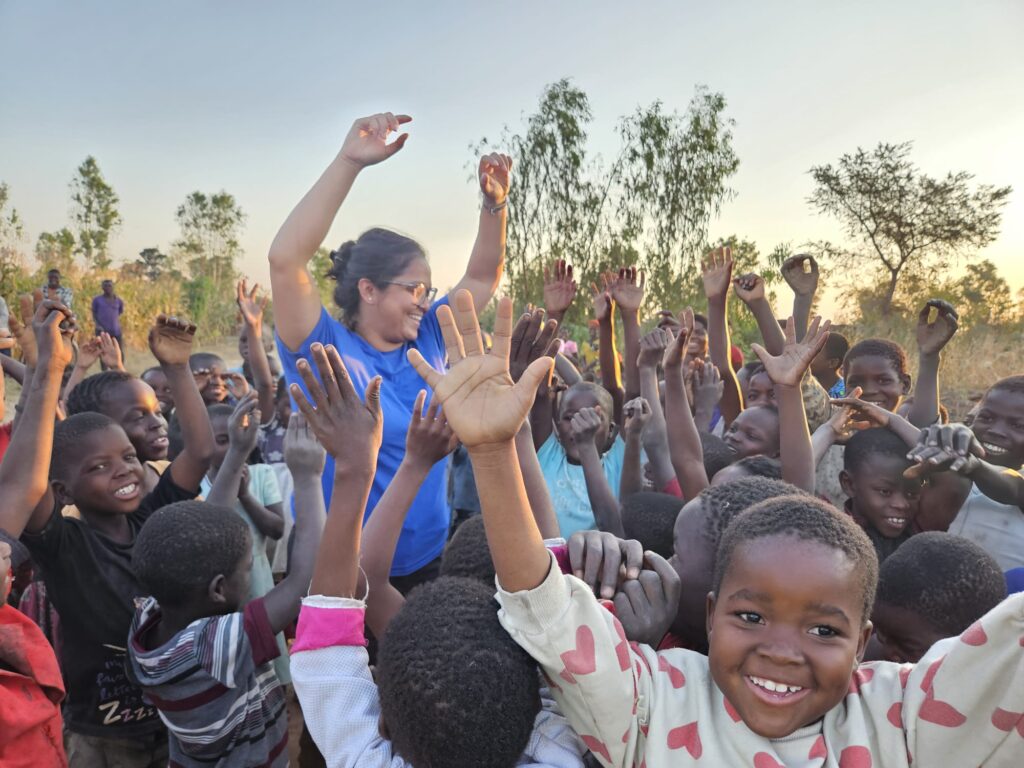
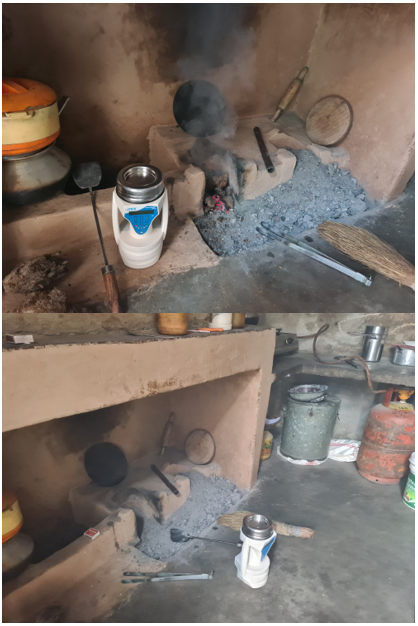
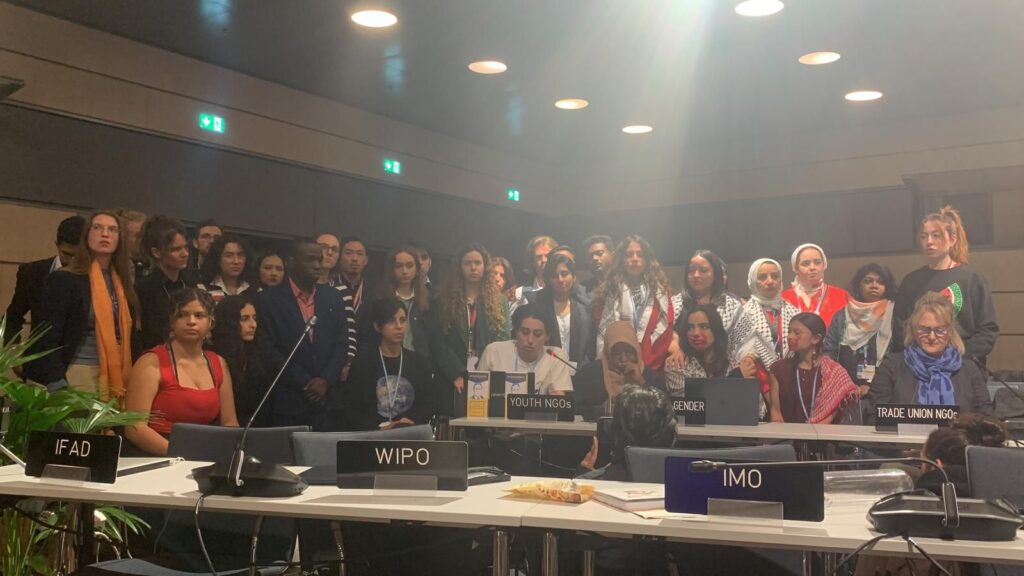
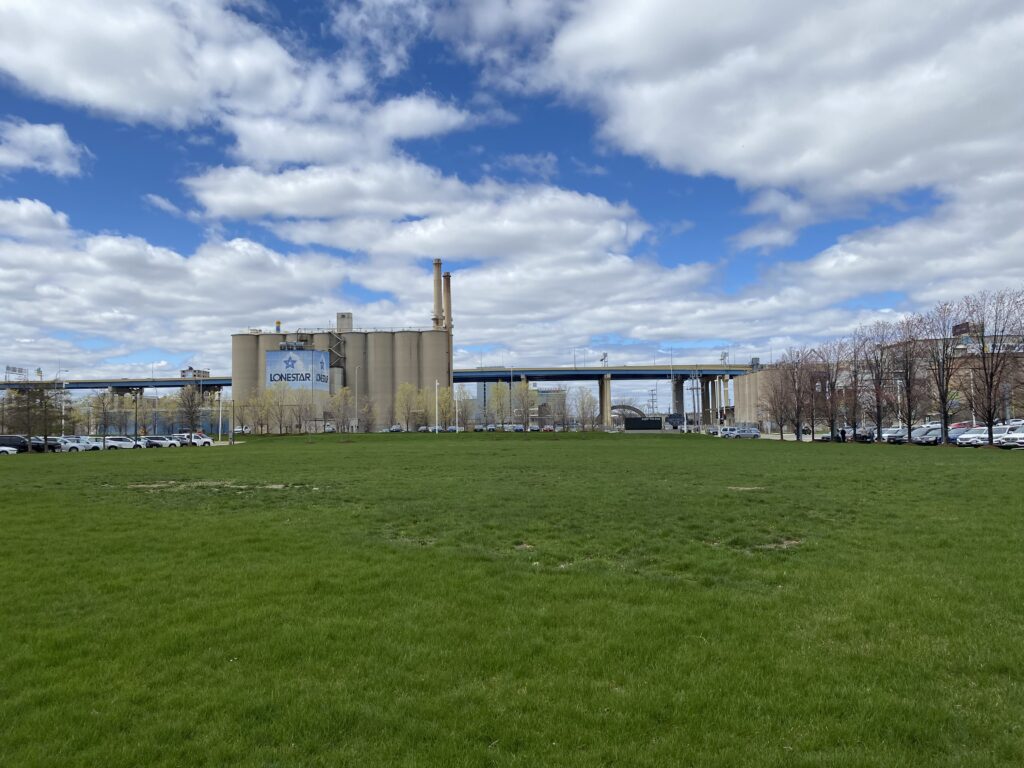
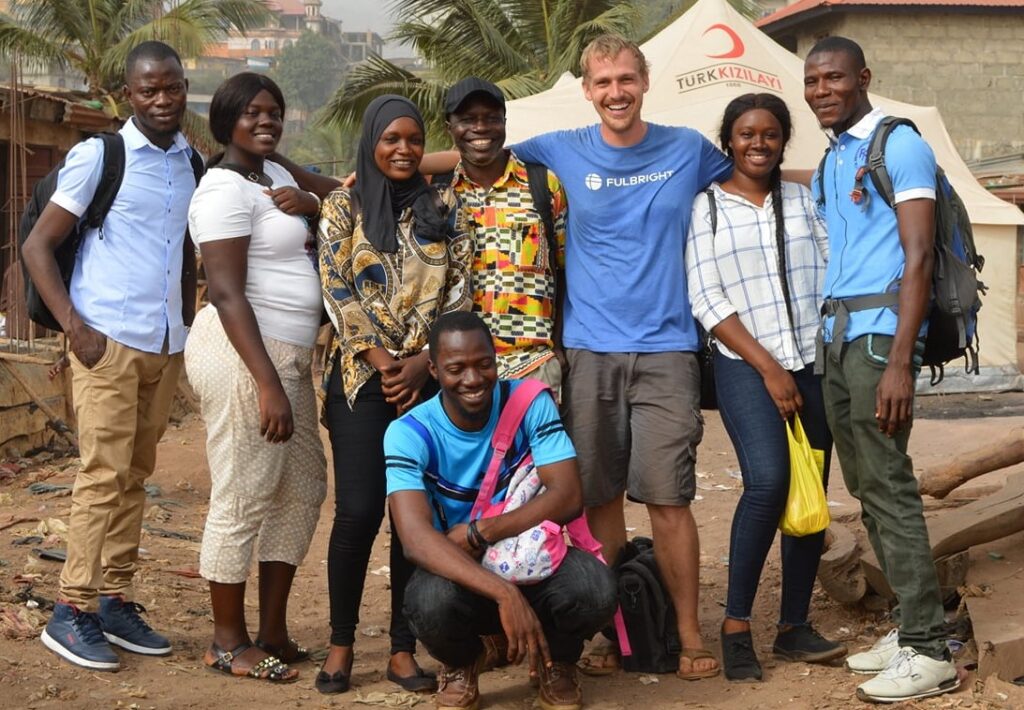
The Dahdaleh Global Health Graduate Scholarship was created to attract exceptional incoming and continuing domestic and international graduate research students to the Dahdaleh Institute for Global Health Research. These scholarships will support graduate research and related scholarly and creative activities in line with the three themes of the Institute—planetary health, global health and humanitarianism, and global health foresighting. The scholarship will be granted annually to graduate students who demonstrate outstanding academic achievement in global health research. The scholarships will be granted to new or returning students based on research excellence or promise of excellence, and applications will be evaluated using the student’s past performance and potential in their graduate program.
Based on the availability of funds and the excellence and needs of applicants, annual scholarships for individual students will range from $5,000 to $25,000 CAD. Scholarship recipients will:
- be designated as “Dahdaleh Graduate Global Health Scholars” at the Dahdaleh Institute;
- attend and participate in the Dahdaleh Institute’s weekly global health graduate seminars;
- present their work once in the Fall and once in the Winter term as part of the Dahdaleh Institute’s Current Global Health Research at the Dahdaleh Institute Seminar Series
- receive occasional invitations to participate in workshops and special events at the Dahdaleh Institute; and
- have access to the Dahdaleh Institute open workspace.
For more information, please visit the Dahdaleh Global Health Graduate Scholarship Program webpage.
Themes | Global Health & Humanitarianism, Global Health Foresighting, Planetary Health |
Status | Active |
Related Work |
N/A
|
Updates |
N/A
|
People |
Yuliya Chorna, Dahdaleh Global Health Graduate Scholar, Faculty of Liberal Arts & Professional Studies - Active
Valerie Lawson, Dahdaleh Global Health Graduate Scholar, Faculty of Liberal Arts & Professional Studies - Active Rupsha Mutsuddi, Dahdaleh Global Health Graduate Scholar, Faculty of Health - Active Romeo Joe Quintero, Dahdaleh Global Health Graduate Scholar, Faculty of Environmental and Urban Change - Active Nilanjana Ganguli, Dahdaleh Global Health Graduate Scholar, Faculty of Environmental and Urban Change - Active Nawang Yanga, Dahdaleh Global Health Graduate Scholar, Faculty of Health - Active Michael De Santi, Dahdaleh Global Health Graduate Scholar, Lassonde School of Engineering - Active Liam Michaud, Dahdaleh Global Health Graduate Scholar, Faculty of Liberal Arts & Professional Studies - Active Kathirvel Soundappan, Dahdaleh Global Health Graduate Scholar, Faculty of Health - Active Joanne Ong, Dahdaleh Global Health Graduate Scholar, Faculty of Health - Active Jesse Sam, Dahdaleh Global Health Graduate Scholar, Faculty of Health - Active Hillary Birch, Dahdaleh Global Health Graduate Scholar, Faculty of Environmental and Urban Change - Active Haniehalsadat Aboutorabifard, Dahdaleh Global Health Graduate Scholar, Osgoode Hall Law School - Active Caroline Diana Duncan, Dahdaleh Global Health Graduate Scholar, Lassonde School of Engineering - Active Brian Waters, Dahdaleh Global Health Graduate Scholar, Faculty of Environmental and Urban Change - Active Babatunde Odugbemi, Dahdaleh Global Health Graduate Scholar, Faculty of Health - Active Ana Carolina de Almeida Cardoso, Dahdaleh Global Health Graduate Scholar, Faculty of Environmental and Urban Change - Active Alexandra Scott, Dahdaleh Global Health Graduate Scholar, Osgoode Hall Law School - Active Alexandra Frankel, Dahdaleh Global Health Graduate Scholar, Faculty of Liberal Arts & Professional Studies - Active |
You may also be interested in...
Recap - Anticipating Responses to Rapid Climate Velocities in Canadian Fishing Communities
On January 10, 2024, Sherif Shuaib, a graduate scholar at the Dahdaleh Institute, presented his research on predicting adaptations to rapid climate velocities in Canadian fishing communities. Shuaib delved into the intricate relationship between fishing ...Read more about this Post
Recap – Rising Heat and Restless Nights: The Impact of Elevated Temperatures on Sleep and Cognition
What is the relationship between sleep, our ability to think clearly, and climate change? This was the question that Dahdaleh faculty fellow Professor Godfred Boateng and Dr. Gabriel John Dusing, who is a Research Fellow, ...Read more about this Post
DIGHR awarded major grant from Creating Hope in Conflict: A Humanitarian Grand Challenge to help improve safe water and public health in humanitarian crises
The Humanitarian Water Engineering Lab at the Dahdaleh Institute for Global Health Research has been awarded a major grant from Creating Hope in Conflict: A Humanitarian Grand Challenge (CHIC) as part of its Transition to ...Read more about this Post
